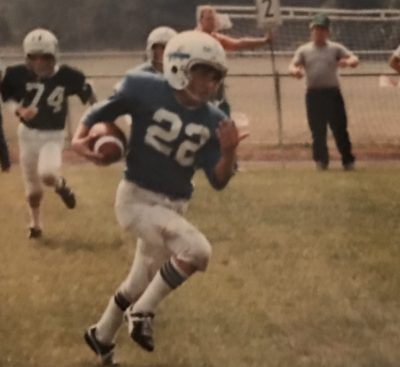
Robert Francis (pen name)
Fifteen Years as a Social Worker: Robert Francis
I experienced a happy, normal childhood, which was the best time of my life. I enjoyed playing sports like basketball and football. My dad coached many of my teams, and my mom attended all of my games to cheer me on. I have one older brother who I enjoy a strong bond with to this day.
I was greeted by schizophrenia at age 22. I had just graduated with my bachelor’s of arts degree from SUNY Geneseo in 1993. Following my graduation, I moved back home with my mother. It was at this time that my behavior began to slowly deteriorate. I thought I had a microchip inserted in my brain by the government and that I was being surveilled. As these delusions worsened and intensified, I became very paranoid.
那时,我也开始听到声音。他们听起来像是从天空中传来的呼喊声。我能听到克林顿总统对我说话。此外,我认为我在电视上看到的人在谈论我,说我住在哪里以及我是谁。当我的现实变得持续妄想时,我以为政府在监视我,我被用在了一个恶意的阴谋中。
Schizophrenia was never more trying for me than during my first onset of psychosis. Many patients experience anosognosia, which is lack of insight and a common schizophrenia symptom. I also struggled with anosognosia. I knew nothing about schizophrenia and never would have dreamed that a brain disorder was the source of my troubles.
After close to a year of rampant and severe psychosis, I was ultimately brought by my family, via an intervention of sorts, to the hospital. My family would have acted sooner, but they also knew nothing of schizophrenia, even though they did notice my behavior was becoming erratic. It took a while for them to conclude that it was something greater than just quirky or atypical behavior. This was the first of my inpatient admissions.
My first hospital admission was difficult. I was given intramuscular haloperidol, which caused all my muscles to contract (a condition called dystonia). I could not walk and crawled my way down the hallway to find help. The staff gave me Benadryl and the contractions stopped. I was off to a rough start!
After this first admission, I then began outpatient treatment at a community clinic. My psychiatrist started me on olanzapine (Zyprexa). Everyone is different, but for me, Zyprexa was awful. I felt cognitively zoned-out and impoverished, and I was tired all the time. I later came to know the medicinal slang of being “snowed.” And “snowed” I was! Zyprexa induced a lethargy in me, and I felt no motivation other than to watch TV and sleep.
由于副作用和它给我的感觉,我完全停止服用 Zyprexa。然后,我根本没有吃药。几个月后,我的家人发现我的精神病复发了,再次将我带到医院。
Initially during my second hospitalization, I was very confused. I would sit for hours just watching the activity in the hospital milieu without saying a word. I was scared and paranoid. But fortunately, during this second hospitalization, my doctor refused to give up on me and was committed to my recovery. He suggested a medication I had never heard of before, clozapine. I was warned that there were many potential side effects, however, we determined I had to try it.
开始使用氯氮平三天后,我又恢复了健康。我周围的所有人都对我恢复清醒和理性的能力感到震惊。我的许多症状都消退了。我回到家感觉好多了。氯氮平真的感觉像是一个奇迹。
After this second and final hospitalization, I moved on and started attending Continuing Day Treatment (known as CDT). I attended CDT for close to a year (unfortunately, this treatment modality has now been eliminated). CDT gave my day structure and the opportunity to be around others with similar problems. I learned a lot at CDT about the various mental illnesses. It provided me with invaluable psychoeducation.
Finally, after months of stability on clozapine, a social worker at CDT encouraged me to apply to become a peer counselor. She thought I had the capacity to help others.
I eventually became a peer counselor and really enjoyed the job. As a peer counselor, I worked in a hospital providing peer support to patients on the inpatient psychiatric units. I enthusiastically communicated that recovery is possible. I tried to serve as a role model for patients who were struggling.
After six months as a peer counselor, I applied for a full-time job at a group home for people with mental illness and was hired. After one year, I was promoted to assistant manager. Six months later, I was promoted to program manager, and I held this position for three years.
With the desire to further a career in human services, and specifically mental health, I decided to apply for a master’s of social work (MSW) program at a nearby university and was accepted. I attended college full-time for two years and received my MSW in 2006. In 2009, I earned my LCSW (licensed clinical social worker).
I have now been a mental health therapist for close to 15 years. Over the last two years, I have written two books about my life living with schizophrenia, including my most recent book, 精神分裂症的基本伴侣. These books have been cathartic for me. 他们为我提供了与他人分享我的故事的机会。我为精神分裂症患者、他们的家人以及治疗他们的专业人士写作。如果有人从我的努力中受益,我就达到了我的目标。
I cannot say I do not have ongoing symptoms. I do. But my recovery boils down to this: I have learned to function despite my symptoms. I have capably adapted. It took me a long time to learn to live with schizophrenia, but I have indeed learned, and I continue to refine my coping skills.
最重要的是,我学会了接受。我接受它每天的挑衅,我没有抱怨。我知道无论精神分裂症的挑战可能扩大到什么程度,我都可以坚持下去。
精神分裂症在我身上形成了一种我以前不知道的力量。对我来说,这就是我所说的恢复。


